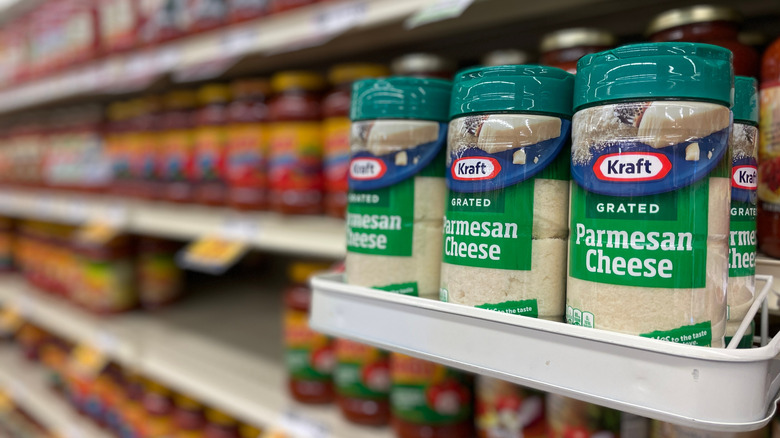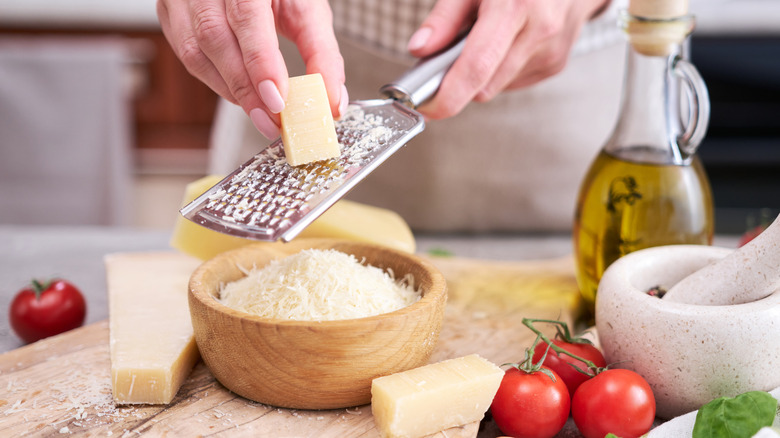What's Really Hiding Inside Your Store-Bought Parmesan Cheese Shaker
One of the greatest pleasures when dining at an Italian restaurant is when the server hovers over your hot entree and asks, "Fresh grated Parmesan?" Those little shavings lightly drop on top of your savory pasta as you feel your tastebuds waking up. Parmesan cheese, or its formal name Parmigiano-Reggiano, is made from high-quality milk from cows in a specific region in Italy. Its 12-month aging process is part of why Parmesan cheese gets its unique taste (and it's one of the healthiest cheeses you can eat).
You could try to make those same Italian restaurant dishes at home, but you won't get that same flavor of fresh-grated Parmesan from that store-bought shaker. Parmesan cheese is made with just cow's milk, enzymes to help coagulate the milk, and salt. Store-bought Parmesan cheese sold in shakers will add cellulose to prevent the cheese from caking. You might also see potassium sorbate to protect the flavor of the cheese. The Center for Science in the Public Interest considers both cellulose and potassium sorbate safe food additives, so it might help to understand why.
What are cellulose and potassium sorbate?
You might have seen overdramatized headlines on your TikTok, Facebook, or Instagram feeds about "wood chips" or "sawdust" in your Parmesan cheese (and other foods like bread, ice cream, and syrup). They're talking about cellulose. Cellulose is a dietary fiber that zips through your digestive system without breaking down. You might see cellulose appear as cellulose gum, carboxymethyl cellulose, or microcrystalline cellulose in a list of ingredients. Yes, cellulose comes from plants because it's what holds plant cells together. Think how well celery holds together when you eat it. According to the Environmental Working Group (EWG), cellulose possesses low risk for concerns such as cancer, allergies, and reproductive toxicity. (Find out which food additives are banned in Europe but not in the United States.)
Potassium sorbate is a synthetic, tasteless salt that prevents mold and other microorganisms from growing inside your Parmesan cheese shaker. Because it's tasteless, you'll find potassium sorbate in wine, baked goods, and yogurt. It's also used in cosmetics, contact lens solutions, and pet food. Potassium sorbate breaks down in your digestive system as water and carbon dioxide. The EWG considers potassium sorbate low-risk for cancer and reproductive toxicity, but this additive might cause skin allergies if used in cosmetics.
Should you throw out your store-bought parmesan cheese?
If you're looking for that authentic, nutty taste of Parmigiano-Reggiano from Italy, look at the ingredient label. Authentic Parmesan is protected by its Protected Designation of Origin (PDO) status, which means the cheese comes from the designated region in Italy. Because this type of cheese is imported and aged for at least 12 months, you probably won't find this type of cheese in your Parmesan shaker. Parmigiano-Reggiano tends to be a little pricier. Your grated Parmesan has fewer stringent rules and probably has only been aged for about 10 months.
If you're not too particular about the unique flavor of your Parmesan cheese, you don't need to toss out your Parmesan shaker. It makes a flavorful topping for popcorn, Brussels sprouts, or this gluten-free Chicken Parmesan recipe. For cooking those decadent Italian dishes, head to the deli department and look for Parmigiano-Reggiano on the cheese rind or outside packaging. You can purchase a small wedge of Parmesan and grate it fresh at home. Some gourmet or specialty stores might also sell grated or shredded Parmesan that doesn't have the food additives in your shaker.


